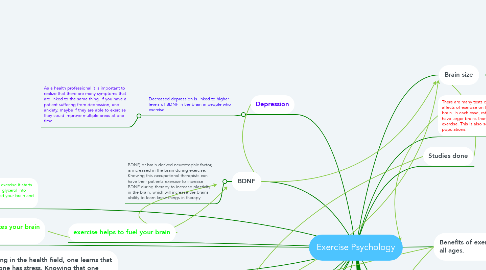
1. There are similar findings when studying stress. There more you do the better you feel.
2. Working in the health field, one learns that everyone has stress. Knowing that one person might be less able to respond to those stressors because of their cardiovascular fitness is important.
3. When your body expects exercise it starts to convert fatty acids and glycerol into glucose. This helps to feed your brain and help it function better.
4. Exercise improves ones resilience to Anxiety
4.1. As a Healthcare professional it is important to understand how to help people respond to anxiety. Knowing that they can work to reduce anxiety through exercise is important.
5. Exercise Re routes your brain circuitry
6. Individuals who are more fit are shown to have lower levels of reaction to stress.
7. Stress and cardiovascular fitness are linked both ways. 20 minutes of aerobic exercise is shown to lower acute stress.
8. There are studies done that show the cognitive function and cardiovascular fitness.
9. BDNF
9.1. BDNF, or brain-derived neurotrophic factor, is increased in the brain during exercise. Knowing this occupational therapists can have their patients exercise to increase BDNF during therapy to increase plasticity in the brain, which will increase the brains ability to learn knew things in therapy.
10. Depression
10.1. Decreased depression is linked to higher levels of BDNF in the brain in people who exercise.
10.1.1. As a health professional it is important to realize that there are many symptoms that are linked to the same thing. If you have a patient suffering from depression, and anxiety, maybe if they are able to exercise they could improve multiple areas at one time.
11. Cardiovascular fitness hypothesis
12. Stress
13. exercise helps to fuel your brain
14. Endorphins
14.1. Endorphins get their name from "endogenous morphine." The endorphins hypothesis is the idea that endorphins are a naturally made morphine like substance in your body that improves your mood. Endorphins are released after you exercise. This theory is widely combated in exercise psychology.
15. This should also help to increase self-esteem, right? Isn't there a link between body image disorders and depression?
16. So far exercise has been helpful to show decreased depression in people of all ages. The same is true for cardiovascular anxiety, and stress.
17. There are many tests done that study the affects of exercise on the size of a rats brain. In each case, rats who do exercise have larger brains than rats who don't exercise. This is also seen in older populations.
18. Brain size
18.1. Occupational therapists can use studies that discuss brain size and exercise to do more active therapy with their patients.
19. Studies done
20. Benefits of exercise for people of all ages.
20.1. Health Behaviors require change
20.1.1. Change through Capability
20.1.1.1. Most who works in healthcare field will have influence on people's health behaviors. It is important for health providers to understand the best way to change behaviors in clients.
20.1.2. Change through Motibility
20.1.3. Change through Opportunity
20.2. There are multiple theories to cause change
20.2.1. The behavior change wheel
20.2.2. COM-B model
20.2.3. ISLAGIATT
20.2.3.1. This is not a good idea, because there is not understanding of what is actually needed, or what will cause change. As an Occupational therapist it is important to understand that health initiatives must be thoroughly researched.
21. The more the Merrier
21.1. Research tends to show that a little exercise leads to a little less depression, while a lot of exercise leads to a lot less depression
21.1.1. As a professional it is important to understand that the client might benefit from doing an hour of exercise a day. But it is important to start out small so that the client is not overwhelmed. Especially if they come from a background of not exercising at all. If they can start with a tiny bit of exercise, and see the improvements that they have made, they may be self motivated to do more by themselves.
22. Exercise can Increase Self-efficacy
22.1. Increase in Physical activity can lead to an increase of Physical self-concept, which leads to global esteem and Physical acceptance
23. Exercise to change Body composition can help to change self esteem through
23.1. But this should not be the focus of physical Exercise, The focus should be a goal of physical achievement.
23.2. In most health profession, It is important to understand that goals should not focus solely on a particular body shape. This is not something that one can necessarily guarantee.
24. Participants need to value the benefits of exercise for it to be helpful
24.1. THis is not something that we discussed with the other benefits of exercise.
24.1.1. As a health professional it might be easier to show them the results of exercise to get the client more motivated, but that approach would not work well with this.

